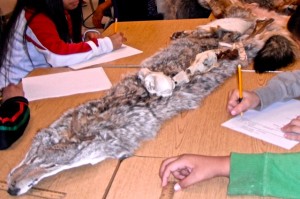By Janet Kearsley, WWO Education Project Coordinator and Tiffany Bishop, Project W.O.L.F.F Coordinator.
The students in the Cle Elum middle school have been exploring the wild-side of Eastern Washington by participating in an exciting new curriculum called Project W.O.L.F.F. (Wildlife Observational Learning and Fieldwork Fundamentals) initiated this year by Western Wildlife Outreach, the Woodland Park Zoo and the Yakima Basin Environmental Education Program, with assistance from the Washington Department of Fish and Wildlife. The Yakima Basin was specifically targeted for this innovative approach to teaching about carnivore/prey relationships because it includes habitat for endangered grizzly bears as part of the North Cascades ecosystem, has a newly established pack of wolves in the Teanaway basin just outside Cle Elum, and has many other carnivores and their prey such as elk, mule deer, and mountain sheep so the students are relating to wildlife literally living in their own “backyard”.
The initial curriculum in use in the classroom was modified from the International Wolf Center’s Gray Wolves, Gray Matter, a resource that goes beyond biology to analyze the human aspects of the wolf’s survival. This curriculum helps educators address a true environmental controversy in a holistic, objective manner. The program has been modified to include other major carnivores in the region: grizzly bears, black bears, cougars and bobcats in addition to wolves. Some elements of the WDFW-developed Project Cat, (another highly successful school program focusing on cougars) were also incorporated into Project W.O.L.F.F. Tiffany Bishop, field coordinator for Project W.O.L.F.F, is working alongside teachers and students in the classroom, assisting students with their own science-based examinations of the animals. College students from Central Washington University out of Ellensburg are also providing assistance in the classroom.
The program is being developed as a hands–on, experiential learning curriculum which will eventually be available to schools throughout the region. The students have an opportunity to touch and explore real carnivore and prey species’ pelts, bones, antlers and hooves plus simulated items like casts of paw prints and scat. Students are learning how to make their own examinations, take measurements, and record their observations. This experience plus exposure to the work of scientists studying carnivores and their prey in the Yakima Basin, will prepare students for more advanced science studies in wildlife biology and ecology and provide them with tools to help them identify their own ideas about how human communities can coexisting with carnivores. The program is participating with Department of Fish and Wildlife to track the movement of elk that have been collared in the Yakima Basin and to learn about the DNA testing being done on the carnivore hair samples collected from “hair corrals” being installed along wildlife corridors in the North Cascades.
Western Wildlife is currently seeking funds to develop a hands-on K-3 curriculum with a carnivore reading trunk and a high school intensive field program as well as expanding the program in the Yakima Basin as well as to other parts of the state and region. Funds will be sought to hone the curriculum, align the curriculum components with specific education requirements for Washington State students, and to conduct teacher training workshops and purchase classroom supplies.

